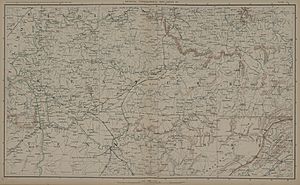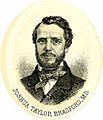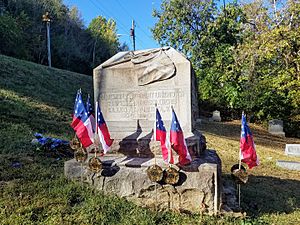Battle of Augusta (1862) facts for kids
Quick facts for kids Battle of Augusta |
|||||||
|---|---|---|---|---|---|---|---|
| Part of the Western Theater of the American Civil War | |||||||
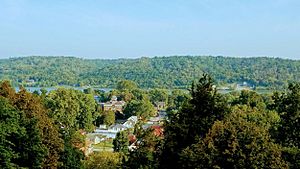 View of Augusta from Hillside Cemetery |
|||||||
|
|||||||
| Belligerents | |||||||
| Commanders and leaders | |||||||
| Units involved | |||||||
| Home Guard (Union) | Second Kentucky Cavalry (Morgan's Cavalry Brigade Confederate Army of Kentucky) | ||||||
| Strength | |||||||
| 150 | 450 | ||||||
| Casualties and losses | |||||||
| 12 killed 3 wounded 125 prisoners |
21 killed 18 wounded |
||||||
The Battle of Augusta was a fight during the American Civil War. It happened on September 27, 1862, in Augusta, Kentucky. The battle was between local Union soldiers, called the Bracken County Home Guard (Union), and Confederate cavalry. The Confederate soldiers were led by Colonel Basil W. Duke. He was the brother-in-law of a famous Confederate general, John Hunt Morgan.
The Confederates won the battle. However, they lost many soldiers and ran out of ammunition for their cannons. Because of this, Colonel Duke had to give up his plan to cross the Ohio River into Ohio. During the fighting, twenty buildings in Augusta were burned down and destroyed.
Contents
Why the Battle Happened
Kentucky's Importance in the War
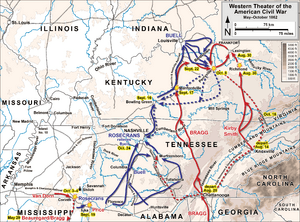
Kentucky was a very important state during the Civil War. It was located between the Southern (Confederate) states and the Northern (Union) states. Both sides wanted control of Kentucky. This was because of its central location and its control over key rivers, like the Ohio River.
Even the presidents of both sides were from Kentucky. Abraham Lincoln, the Union president, once said that losing Kentucky would be like losing the whole war. At first, Kentucky tried to stay neutral. This meant they did not want to pick a side. But this neutrality ended in September 1861. Confederate troops entered the state, and then Union troops followed. Kentucky never officially left the Union. However, some people in Kentucky supported the Confederacy.
Confederate Plans for Kentucky
In 1862, Confederate generals wanted to invade Kentucky. They hoped to get supplies and new soldiers there. They also wanted to make Union troops move away from Tennessee. Colonel John Hunt Morgan had already led a successful cavalry raid into Kentucky. He found that many people there supported the Confederacy. He believed that thousands of men would join the Confederate army if they invaded.
Two main Confederate generals, Edmund Kirby Smith and Braxton Bragg, planned to invade Kentucky. Their idea was to combine their armies. Then, they would try to trap the Union army. They hoped to destroy the Union forces and claim Kentucky for the Confederacy. They thought the people of Kentucky would welcome them.
However, their plan did not go smoothly. General Smith decided to go ahead on his own. He marched north into Kentucky. General Bragg followed later. Meanwhile, the Union general, Don Carlos Buell, moved his army. He wanted to make sure the Confederates could not capture important cities like Louisville and Cincinnati.
Bragg and Smith eventually met in Frankfort. They even attended the inauguration of a Confederate governor for Kentucky. But Union forces were getting close.
Duke's Move to Augusta
While the main armies were moving, Colonel Basil Duke was in northern Kentucky. He was doing scouting missions and small raids. He heard that Union forces were gathering in Augusta. Duke wanted to cross the Ohio River into Ohio. He thought this would make the Union troops in Kentucky retreat to protect Cincinnati. He knew there was a shallow spot in the river near Augusta where his men could cross. So, Duke decided to move his troops to Augusta.
Who Fought
Union Forces
| Union Commander |
|---|
|
|
- About 125 to 150 local Home Guard soldiers. These were citizens defending their town.
Confederate Forces
| Confederate Commander |
|---|
|
|
- About 450 men from the Second Kentucky Cavalry.
- They also had two small cannons called "mountain howitzers."
The Battle
Around noon, Colonel Duke's Confederate soldiers arrived at Augusta. They took positions on the hills overlooking the town. Two Union gunboats, the Florence Miller and Belfast, were on the Ohio River. The Belfast fired its cannon at the Confederates. This caused some damage to a Confederate cannon crew.
The Confederate cannons fired back at the boats. They hit the boats a few times. Duke sent some of his men to a sandbar on the river. The Union gunboats saw them coming. They knew their boats were not well protected. So, the gunboats moved away from Augusta, further up the river. The Florence Miller was hit over 150 times by small arms fire from the Confederates on the sandbar.
Duke thought it would be an easy victory now that the gunboats were gone. He sent his soldiers into town. The Union defenders were about 150 local citizens. They had taken shelter in the brick buildings. Many of them were on the second floors. They fired down on the Confederates. This caused many casualties among the Confederate officers.
The Confederates who had been on the sandbar now rode into town. Some of them were accidentally hit by their own cannons firing from the hills. The fighting became very intense. There were reports of hand-to-hand combat. Duke saw that some Union defenders were trying to surrender. But others kept shooting at his men. So, he ordered one of his cannons into town. It fired at close range into the buildings where the defenders were. This caused many buildings to catch fire.
Duke had wanted to stop the Union from recruiting new soldiers in the area. He also wanted to cross the Ohio River and threaten Cincinnati. But after the battle, his army had lost many men. Also, they were running very low on ammunition for their cannons. Because of this, Duke had to retreat back to Brooksville.
The next morning, Duke was releasing the captured Union soldiers in Brooksville. Another Union force attacked him. This was a very small fight, with only one person hurt. Duke was then able to retreat to Falmouth.
Images for kids
 | Claudette Colvin |
 | Myrlie Evers-Williams |
 | Alberta Odell Jones |


